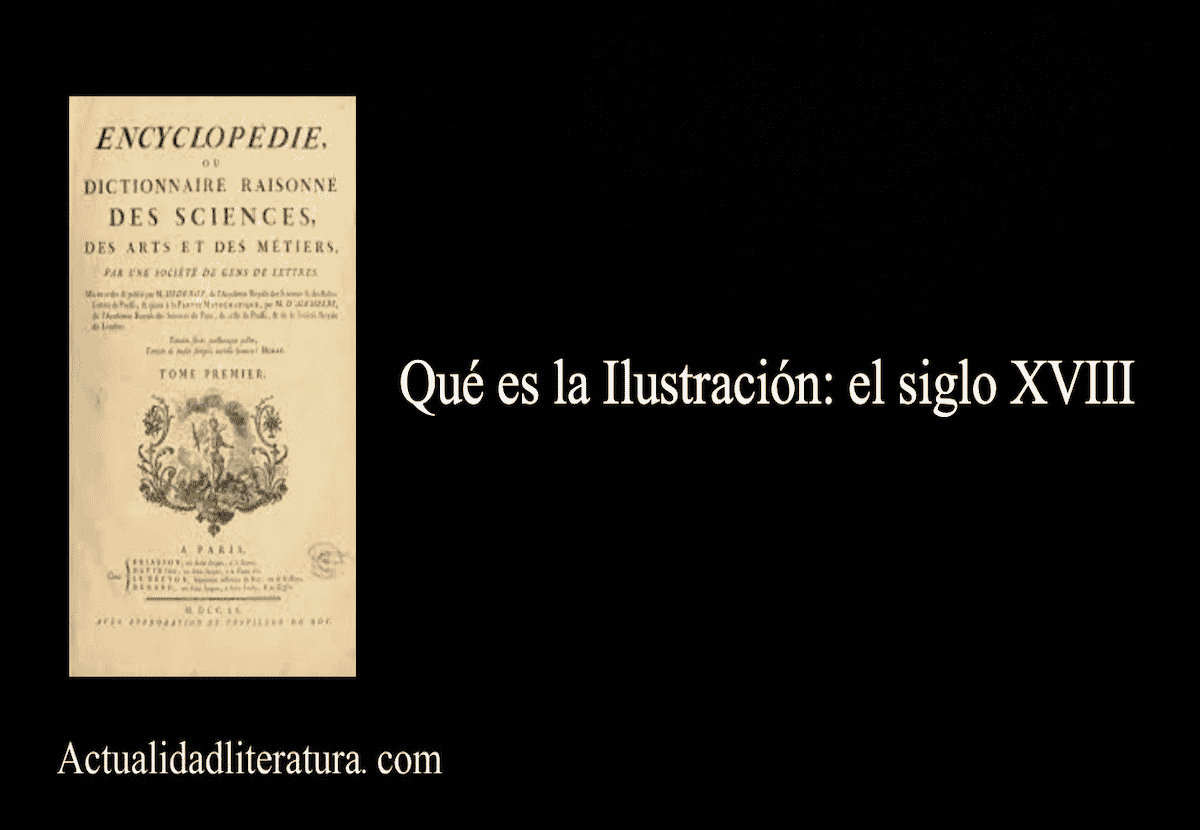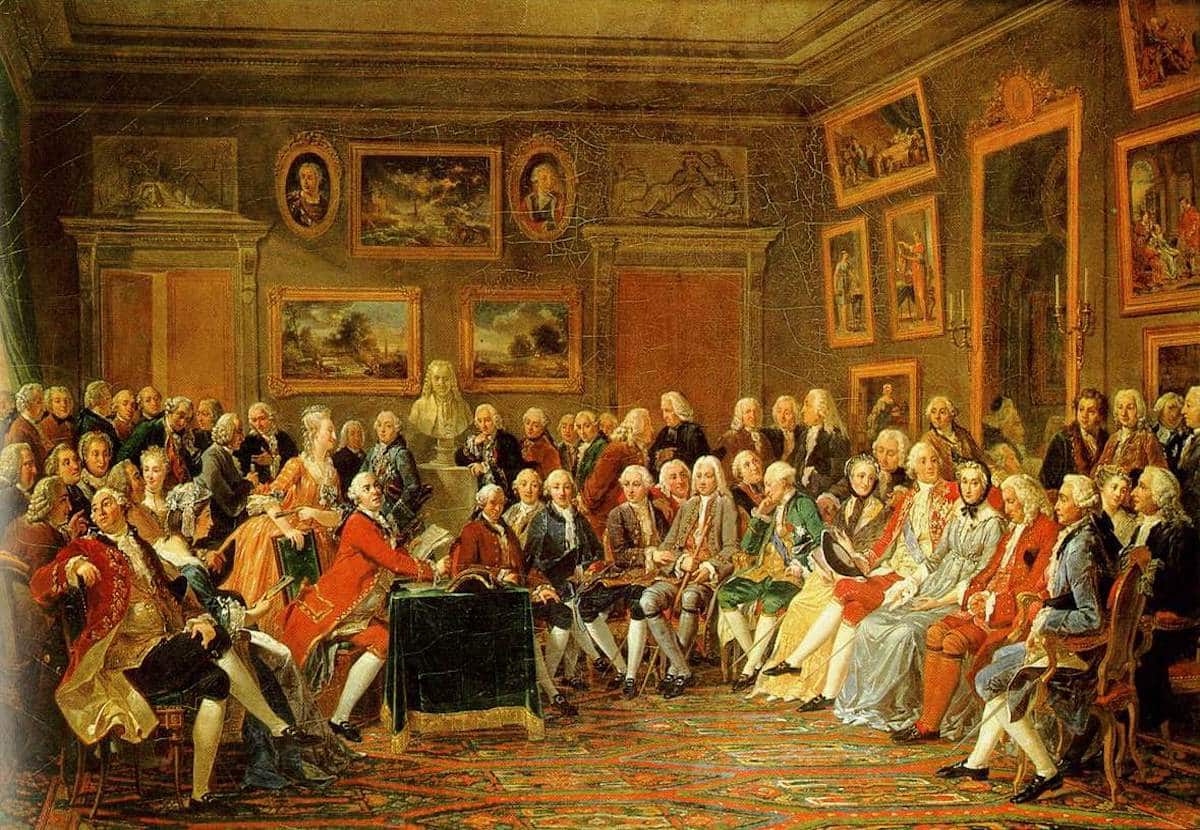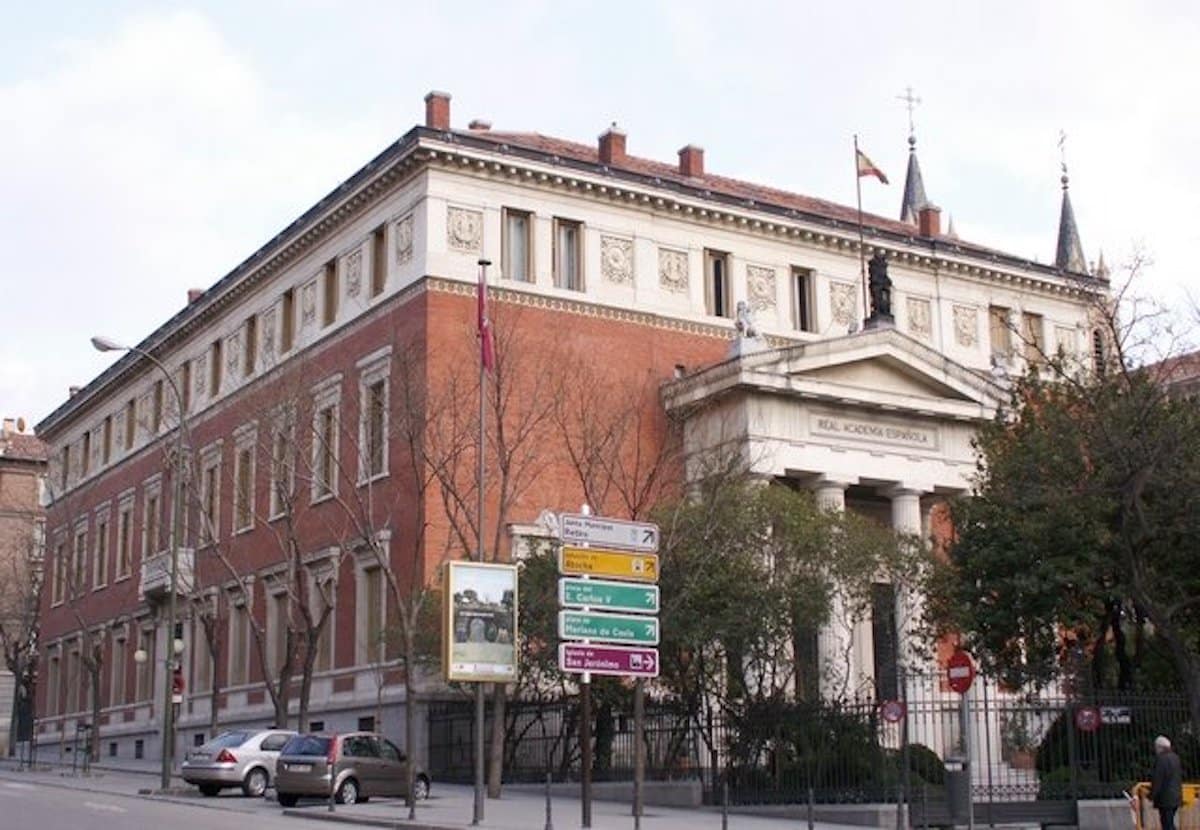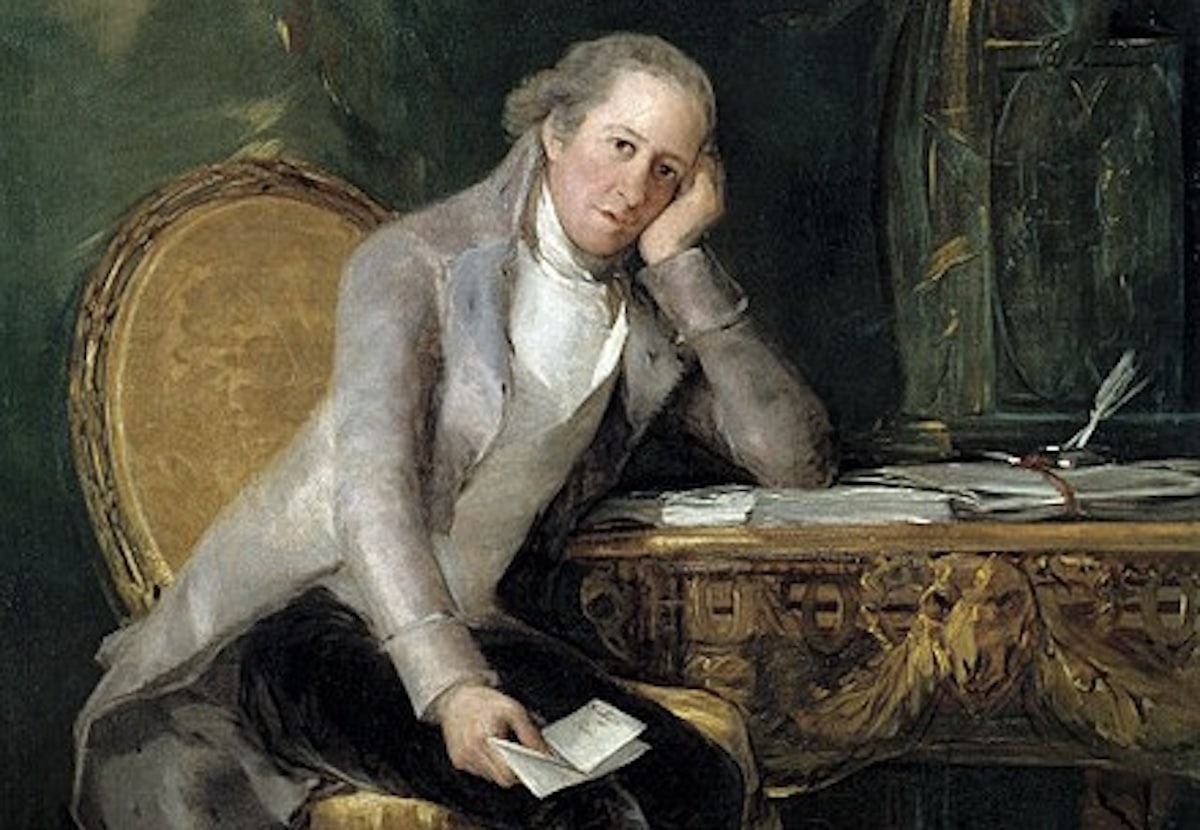
The Enlightenment was the cultural movement that gave birth to reason. It is commonly known as the Age of Enlightenment, the XNUMXth. It was a movement that not only changed Literature, it also encompassed Arts, Science, Philosophy and Politics, and encouraged social movements, such as the French Revolution.
During the second half of the XNUMXth and early XNUMXth centuries, the Enlightenment spread through the halls of scholars and thinkers and helped improve the world. However, that was perhaps also his fault. On the one hand, it promoted the demolition of barriers, but new ones were also formed. In short, it was a bourgeois movement.
Origin and context of the Enlightenment
It was named the Age of Enlightenment because it arose with the aim of providing light to the obscurantist foundations on which political and public life was still based, with religion enjoying a preferential place. This ancient society was characterized by ignorance and superstition. The old beliefs, illiteracy and the stratified and military hierarchization continued to predominate until then. From top to bottom. The monarchical power was also unquestionable, because the kings ruled and they did so because they were chosen by God.
And although the Enlightenment promoted many transformative changes, they rushed into a continuism that continued to separate decision-makers from the people. Therefore, power was conceived vertically again. They wanted to make a path of improvement for everyone, but without counting on all social layers. For this reason, it will surely work at the time to achieve a later cultural and social transition. Thus, the nineteenth century would bring new changes in various much more transversal social directions.

Madame Geoffrin's Salon (1812), painting by Charles Gabriel Lemonnier.
Features
- Enlightened Despotism: the powers fell into a kind of paternalism with the people. He wanted to educate people through the dictates of the Enlightenment with the conviction of doing what was best for the citizenry, but without involving them. And power remained absolute for the king.
- Anthropocentrism: God is displaced by man.
- Rationalism: reason prevails over faith.
- Pragmatism and the consequent philosophical line of the Utilitarian. Closely linked to pedagogy and the importance of learning only subjects that can be put into practice.
- Imitation: attempts to return to the classical authors (neoclassicism).
- Idealism: by pretending to distance themselves from reality and the crude and seeking the aesthetic, they also distance themselves from the people and their authentic needs. It is a rejection of the popular.
- Universalism: returns to the classical origin of literature and philosophy. What is universal to Western culture, but again does not address the real situation of the people.
The Enlightenment in Europe
To speak of Enlightenment is to speak of the Encyclopedia (Encyclopedia) Denis Diderot and Jean le Rond d'Alembert, who were in charge of the coordination. Also called Reasoned dictionary of sciences, arts and crafts It is an extensive text that tries to encompass the knowledge of letters and that of the scientific field from a pragmatic point of view. Great characters such as Voltaire or Rousseau cooperated in this text. It was published in 1751 in France and is surely the most important work of the XNUMXth century.
The French language was the vehicle for transmitting ideas at this time.. Very well considered, the great works were written in this language. However, in addition to France, the Enlightenment also had special relevance in England and Germany. English, German, or Spanish are saturated with Gallicisms.
In Literature, the most frequent genres belonged to classicism: tragedy and comedy in theater and many fable and satire that encouraged learning through moral teachings. However, many of the works of great depth spoke of Economy and Philosophy; among its most prominent authors are Adam Smith (The Wealth of Nations), Immanuel Kant, David Hume, Montesquieu, and Voltaire and Rousseau, of course. René Descartes or John Locke were a source of inspiration for all of them.
European illustrated narrative
It is also fair to name the other authors who wrote fiction and who with their works also contributed to the eighteenth century and later. Because they were the ones developed the modern novel:
- Daniel Defoe: Robinson Crusoe (1719). It is the well-known story of a man who spends almost 30 years on a desert island after the ship he was traveling on sinks.
- Jonathan Swift: Gulliver's Travels (1726). An adventure novel, the country of Lilliput, where the action takes place and its inhabitants, the Lilliputians, is also very famous.
- Laurence Stern: Vida and opinions of gentleman Tristram Shandy (1759) is a classic that stands out for the narrative technique it uses with internal monologues and ironic questioning.
- Pierre Choderlos of Laclos: Dangerous friendships (1782) is an epistolary novel.
- Donatien Alphonse Francois de Sade, better known as Marquis de Sade: is one of the most controversial writers of all time. His name has served to add a new word to the dictionary, sadism (adjective: sadistic), due to the ruthless details of his texts, as well as his arguments full of perversions. But her books, although controversial, with or without irony, also try in their own way to instruct the reader. They stand out: Justine or the misfortunes of virtue (1791) Philosophy on the dressing table (1795) o The 120 days of Sodom or the school of debauchery written in 1785, but published many years later.

Headquarters in Madrid of the Royal Spanish Academy.
The Enlightenment in Spain
The political context in Spain during the second half of the 1759th century was as follows: the Bourbon reigns of Carlos III (1788-1788) and Carlos IV (1808-XNUMX). Absolutist monarchs in whose regencies the enlightened and progressive ideas of the most advanced Europe did not permeate with sufficient force. Not like in France, at least. In Spain, the most traditionalist doctrines and the Catholic religion were too deeply rooted in the mentality and customs of the Spanish people., who never promoted the change.
We would have to wait until the XNUMXth century for the actual abdication of Carlos IV to take place, and for there to be a progressive monarchy in Spain with a French touch, for the most refined Spaniards to become Frenchified and for everything to finally end in a war of independence and the return of the most iron absolutism by the hand of "the Desired", Fernando VII.
On the other hand, In the cultural sphere, the creation of the Royal Spanish Academy (1713) stands out, since then it has been in charge of "cleaning, fixing and giving splendour" to our language, as well as the Royal Academy of Fine Arts of San Fernando (1752), the Academy of History (1738) or what is today the National Museum of Natural Sciences, among other institutions of enormous importance and prestige. Likewise, the Economic Society of Friends of the Country was an elitist and intellectual group formed by some nobles of the time and that went through different stages, but never abandoned its aristocratic character.

Painting of GM de Jovellanos (1798), by Goya.
Spanish authors of the XNUMXth century
- Fray Benito Jeronimo Feijoo (1676-1764). Benedictine monk, he was a fundamental figure for the works of essay and critical thought. His most important works are Universal Critical Theater (1726) and Scholarly and Curious Letters (1742)
- Gregory Mayans (1699-1781). As an enlightened historian he was very important in the historical essay and his work stands out for its rigor. His most important work: Origins of the Spanish language (1737)
- Gaspar Melchor de Jovellanos (1744-1811). In addition to writing various essays on economics or agriculture (very important is his work Report on the Agrarian Law), contributed to the Spanish illustrated current a classic comedy written in prose, The honest criminal (1787), framed within this refined theater of the Enlightenment.
- Jose de Cadalso (1741-1782). Great Spanish narrator of the XNUMXth century. They highlight their Moroccan Cards (1789), an excellent treatise in epistolary form through a Spanish host and an elegant foreigner of Moroccan origin who tries to learn the curious and somewhat rustic customs of the Spanish. It is also essential gloomy nights (1789-1790), an exquisite and sad mortuary song, although closer to Spanish pre-romanticism.
- Juan Melendez Valdes (1754-1814), the great representative of Spanish poetry of the eighteenth century.
- Thomas of Iriarte (1750-1791) y Felix Maria Samaniego (1745-1801) represent the pedagogical fable of Spanish illustrated literature.
- Leandro Fernandez de Moratin (1760-1828) was the most important playwright of the XNUMXth century in Spain. His comedies stand out The old man and the girl (1790) The yes of the girls (1805), as well as the new comedy (1792)



Completely overrated. At that time it was not known that intelligence (iq) was normally distributed. For this reason, today we know that it was a group of French nerds who thought that through a rational calculation a better life was possible. Let us celebrate that today what we know is that it is not so. We Hispanics did not have Lights. That was imported trinkets.
Let's not believe in France. Never.
Hi Vladimir! Thanks for your comment. Indeed, I have tried to convey the message that the Enlightenment was not a movement for everyone and that, like everything else, it could also have been done better. Also, the Lights in Latin America were very dim! Of course. All the best.